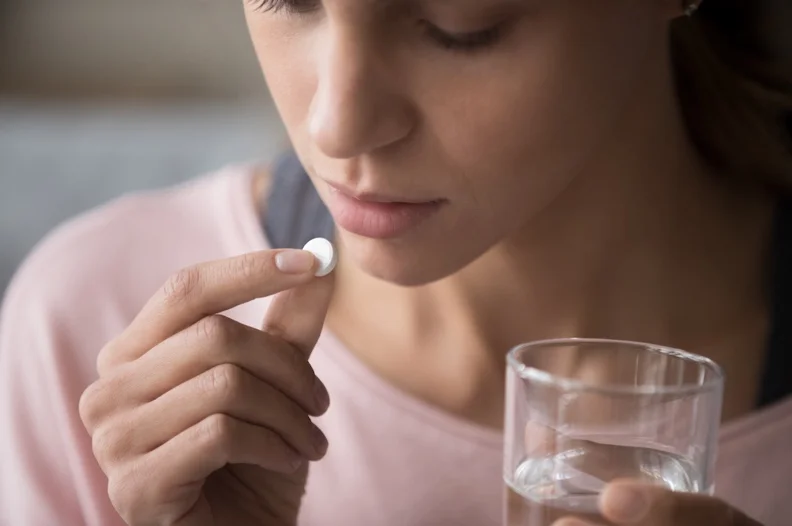Signs of Adderall Addiction and Treatment Options
Adderall is one of the most commonly prescribed and effective medications for the treatment of attention deficit hyperactivity disorder (ADHD). However, Adderall is also a powerful and highly addictive stimulant that is frequently misused.
Adderall addiction is a very serious disease with very serious consequences if left untreated. Luckily, there are a number of warning signs of Adderall addiction that you can look out for.
There is hope!
Download our free Addiction Recovery Guide for Families and learn about addiction, how it’s treated, and how to heal for a more meaningful life.
How Adderall Addiction Develops
Whenever someone repeatedly uses Adderall, even if they are using it according to a prescription, their body will eventually be unable to function “normally” without the drug. If a person stops taking Adderall or reduces their dose, their body will need time to adapt to its absence. During that time, they will experience what are known as withdrawal symptoms. This is known as dependence.
“Adderall is a highly addictive drug, and it can be easy to develop a dependence on it. Once someone is addicted to Adderall, they may find it difficult to stop taking it, even if they know it is causing problems in their life,” says psychiatric mental health nurse practitioner (PMHNP) Valerie Puffenberger.
If someone has a dependence on Adderall, they have developed the first component of an addiction. To have a full-blown addiction, they also have to exhibit behaviors as a result of their Adderall use that are having negative effects on their life.
The Diagnostic and Statistical Manual of Mental Disorders (DSM) lists 11 characteristics of Adderall addiction. To be diagnosed with an addiction, an individual must exhibit at least three of the below criteria. The more criteria an individual exhibits, the more severe their addiction is diagnosed to be:
- Taking larger quantities of Adderall or taking Adderall for longer than intended or prescribed
- Wanting to cut down on Adderall use but being unsuccessful at doing so, perhaps failing multiple times
- Spending large amounts of time acquiring Adderall, using Adderall, and/or recovering from Adderall use
- Cravings for or urges to use Adderall
- Failing to meet professional, personal, scholastic, or financial obligations as a result of Adderall use
- Continuing to use Adderall after it has caused damage to relationships
- No longer participating in personal, professional, familial, or recreational activities as a result of Adderall use
- Using Adderall in situations when it is physically unsafe to do so
- Continuing to use Adderall even after you know that you have a physical or mental problem that is made worse by Adderall use
- Needing to use larger amounts of Adderall to feel the same effects (tolerance)
- The development of withdrawal symptoms that are relieved by taking Adderall (dependence)
Common Signs of Adderall Addiction

It is widely believed that an individual suffering from a substance use disorder needs to hit rock bottom before they will get sober, but that is far from the truth.
In fact, the earlier an Adderall addiction is treated, the more successful treatment is likely to be—and the more damage to the patient’s life will be prevented. This makes identifying the common signs of addiction to Adderall early on critically important.
Here are some of the common Adderall addiction signs:
- Running out of a prescription before the intended time
- Using Adderall outside of prescription guidelines
- Adderall cravings
- Loss of appetite
- Changing group of friends
- Participating in new or unusual activities while abandoning previous ones
- Mood swings
- Increased secrecy, especially about Adderall use
- Increased heart rate and blood pressure
- Intense, often unjustified anger
- Possession of illegal Adderall
- Psychosis
- Withdrawal symptoms when Adderall is not taken
- Snorting Adderall to feel its effects faster
- Frequent nasal or sinus infections
“If you are struggling with an Adderall addiction, I would recommend seeking professional help. There are many treatment options available, including counseling, medication, and support groups. It is important to find a treatment plan that works for you and to stick with it,” says Puffenberger.
Short- and Long-Term Effects of Adderall Addiction
Adderall addiction has many negative consequences if the disease is left untreated. These effects may either be short term or long term.
What Are the Short-Term Effects of Adderall Addiction?
Some of the short-term effects of Adderall addiction include:
- Abdominal pain
- Allergic reaction (can be mild or severe)
- Appetite loss
- Blurred vision
- Difficulty sleeping
- Digestive issues such as vomiting, diarrhea, and vomiting
- Dizziness
- Dry mouth
- Elevated heart rate
- Nervousness
- Restlessness
- Sleep difficulties
What Are the Long-Term Effects of Adderall Addiction?
The effects of long-term Adderall addiction can include:
- Anxiety
- Aggressive behavior
- Breakdown of muscle tissue (rhabdomyolysis)
- Delusions
- Depression
- Death
- Family problems
- Financial difficulties
- Hallucinations
- Heart problems, including heart attack and sudden death
- Irritability
- Legal problems
- Loss of interest in previously enjoyed activities
- Mood swings
- Problems at work
- Reduced blood flow to the fingers and toes (Raynaud’s phenomenon)
- Relationship problems
- Stroke
- Weight loss
What to Do if You Think Someone Is Addicted to Adderall

If you see the signs that someone you love has an Adderall addiction, take the following steps.
- Prepare yourself for a conversation. Because confronting someone about their addiction can be very difficult and may have the opposite result than desired, it is important to prepare ahead of time. It is often advisable to consult with a professional interventionist and engage the support of other loved ones to help you prepare. The more prepared you are, the more likely the conversation is to be successful.
- Confront the Adderall use disorder victim in an appropriate and healthy manner. In some circumstances, a formal intervention with multiple individuals will be desirable. In others, a one-on-one conversation may be more advisable or feasible. Always try to avoid shaming, blaming, or attacking the Adderall addiction victim. Instead focus on how much you care about them, how worried you are, and how their actions have personally affected you and others in their lives.
- Set and keep boundaries. Friends and family often inadvertently enable the addiction behavior of their loved ones, allowing their addiction to persist or worsen. Setting and maintaining healthy boundaries will help prevent this and will often motivate the affected individual to seek treatment.
- Encourage treatment in every healthy way possible. Treatment, especially in a rehab program, is the best way for most individuals to attain and maintain sobriety from Adderall. Convincing your loved one that they need help and that you will help them find it is often a deciding factor in their eventual decision to attend treatment. It is often possible to consult with treatment centers and reserve a spot for your loved one. If you’re able to provide them with a reserved spot in a treatment center immediately after the initial conversation, it reduces the possibility that they will change their minds.
Treatment Options for Adderall Addiction
Puffenberger provides the following tips for those seeking help for an Adderall addiction:
- Talk to your doctor. Your doctor can help you assess your addiction and develop a treatment plan.
- Find a support group. Talking to other people who are struggling with addiction can be very helpful. There are many support groups available for people with Adderall addiction.
- Set realistic goals. Don’t expect to quit Adderall overnight. It takes time and effort to overcome an addiction. Set small goals for yourself and celebrate your successes.
- Be patient with yourself. Recovery is not a linear process. There will be ups and downs. Don’t give up if you have a setback. Just pick yourself up and keep going.
While everyone’s journey to recovery will be unique, Adderall addiction is typically treated in one of three ways:
- The taper-down method
- Inpatient rehab
- Outpatient rehab
We’ll explore these three treatment methods below.
The Taper-Down Method
The taper-down method involves gradually reducing the dose of Adderall over time at regular intervals until no more Adderall is being taken.
The taper-down method allows the body to gradually adjust to the lack of Adderall, therefore greatly reducing or entirely eliminating withdrawal symptoms. This is opposed to going “cold turkey,” in which Adderall use is discontinued entirely at once.
The taper-down method should only be done under medical supervision and is typically only advisable for minor and/or short-lasting Adderall use disorders that were caused by prescription Adderall use.
Inpatient Adderall Rehab
Inpatient rehab requires patients to live at a rehab facility where they also receive medications, therapies, and other treatment techniques.
Individual and group therapy are some of the most common and important components of inpatient treatment. Inpatient rehab also heavily focuses on relapse prevention and aftercare planning.
In general, inpatient rehab is more expensive than outpatient rehab and more disruptive to the patient’s life. However, it provides the greatest likelihood of successfully achieving and maintaining sobriety.
Outpatient Adderall Rehab
Outpatient Adderall rehab requires patients to live somewhere else (often a sober living home) and come to a treatment facility several days a week for several hours a day.
The treatments provided during outpatient rehab are generally similar to those provided by inpatient rehab, but it is much less likely to involve medications. Instead, therapy and life skills training are more important.
Outpatient rehab is generally less expensive than inpatient rehab and allows patients to continue to perform personal and professional responsibilities. However, the chances of success are somewhat less than with inpatient rehab.
Supporting a Loved One Through Recovery
If one of your loved ones is in recovery for Adderall addiction, you are probably concerned with how you can support them. However, it is critical that you only provide them with appropriate support. Often, well-intentioned loved ones provide “support” that actually functions as enablement. When you enable an Adderall use disorder sufferer, you actually make it easier for them to continue their addiction and more difficult for them to maintain their recovery.
Examples of appropriate support to provide an Adderall use disorder sufferer include:
- Help develop their treatment, recovery, and aftercare plans
- Set and maintain healthy boundaries
- Make them aware that you love them but not their disease
- Do not place blame or name call
- Do not use guilt
- Attend mutual support groups with your loved one, as well as those for family members of addiction sufferers
- Drive them to treatment and mental health appointments
- Consult with rehabs to find them a spot
- Convince them to attend rehab
- Financially support their treatment and/or mental health care
Get Help With an Adderall Addiction
Adderall addiction is a serious disease with potentially serious consequences. Luckily, it isn’t too late to get help. If you or someone you love is showing the signs of addiction to Adderall, Legacy Healing Center is here to help.
Legacy uses a holistic treatment approach that focuses on healing a patient through their mind, body, and spirit. We use a wide variety of treatment techniques, strategies, and tools to help patients regain their sobriety and maintain it while avoiding relapse. Examples of some of the many services and treatments we provide include:
- Aftercare
- Clinical therapy
- Integration of life factors
- Proper medication management
Don’t wait another minute if you recognize Adderall addiction signs in yourself or a loved one. Call 888-534-2295 to speak with one of Legacy Healing Center’s staff.
Adderall Addiction Signs FAQs
What are the most common signs of Adderall addiction?
Some of the most common Adderall addiction signs include:
- Using Adderall outside of prescription guidelines
- Possessing and/or using illegal Adderall
- Anxiety
- Mood swings
- Loss of appetite
- Weight loss
- Changing friends or activities
- Increased secrecy, especially regarding Adderall
- Crushing and snorting Adderall
- Adderall cravings or urges
How can you tell if someone is addicted to Adderall?
In general, only a treatment professional can properly diagnose an Adderall addiction, and it is critical that you consult with one. However, the best way to tell whether someone may be experiencing an Adderall use disorder is to be aware of the signs of Adderall addiction. If you identify these signs in a loved one, it is best to prepare for a conversation with them and then confront them in an appropriate manner.
What are the treatment options for Adderall addiction?
Each patient and each Adderall addiction are different, which means that what treatment options will be available or advisable will differ from person to person. However, there are three main options for the treatment of Adderall addiction.
- The taper-down method
- Inpatient Adderall rehab
- Outpatient Adderall rehab
Sources
- Partnership to End Addiction. (2023, July). Prescription Stimulant Fact Sheet.
- National Library of Medicine. (2019, April 15). Dextroamphetamine and Amphetamine.
- American Society of Addiction Medicine. (2019, September 15). Definition of Addiction.
- Medical News Today. (2023, March 23) Adderall Side Effects: What You Should Know.




